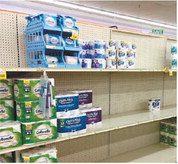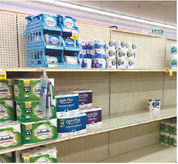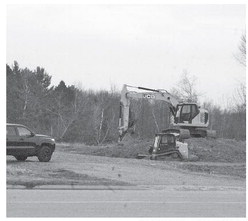Don’t flush that


Shoppers anxious about the impacts of COVID-19 hit the store shelves hard over the past week with toilet paper shelves remaining bare.
Many shoppers faced with shortages of toilet paper in stores are turning to other products for their bathroom cleanliness needs. However, waste experts are warning people to use care with what they flush down the toilet or it may come back to haunt them in the form of clogged pipes and sewage backups.
“The only thing that should be going down the toilet is waste and toilet paper,” said Sue Rodman of Black River Transport.
She said that wipes, even the ones that claim to be flushable, should never been flushed down any system. She explained that cloth-like wipes do not break down in water like toilet paper does and that they get caught up in screens at the sewer treatment facilities. They can also cause problems for home septic systems clogging mound system filters.
According to Rodman, in addition to wipes, shop towels, rags and other products should never been flushed and instead disposed of in the garbage.
Medford wastewater treatment plan superintendent Ben Brooks echoed Rodman’s warnings about what should and should not be flushed down toilets.
“Out of sight and out of mind,” was the thought that many of us grew up with and it continues today. This concept has probably led to many issues, but now a costly problem we never dreamed of. The wipes are chocking our sanitary sewer system, the pumps, screens, manholes, low points or any other area where the flow is restricted. The problem seems to be getting worse.
The disposable wipes can be grouped together from sources like baby wipes, kitchen cleaning wipes, paper towels, facial tissues, bathroom wipes, diaper liners, etc. Additionally, products like diapers, feminine hygiene products, floor cleaning wipes and assorted hand towels all add to the list. These are not meant to be flushed. The only paper product meant to be flushed is old fashion toilet paper, no matter what the manufacturer puts on the label, Brooks said.
“Just because a product label reads, flushable, doesn’t mean it should be flushed. Currently a product can say flushable, if it’s placed in the toilet, the lever is pushed and the wipe goes down out of sight and mind. Flushable doesn’t mean that it biodegrades or even that it breaks down into tiny particles that don’t cause problems,” he said.





